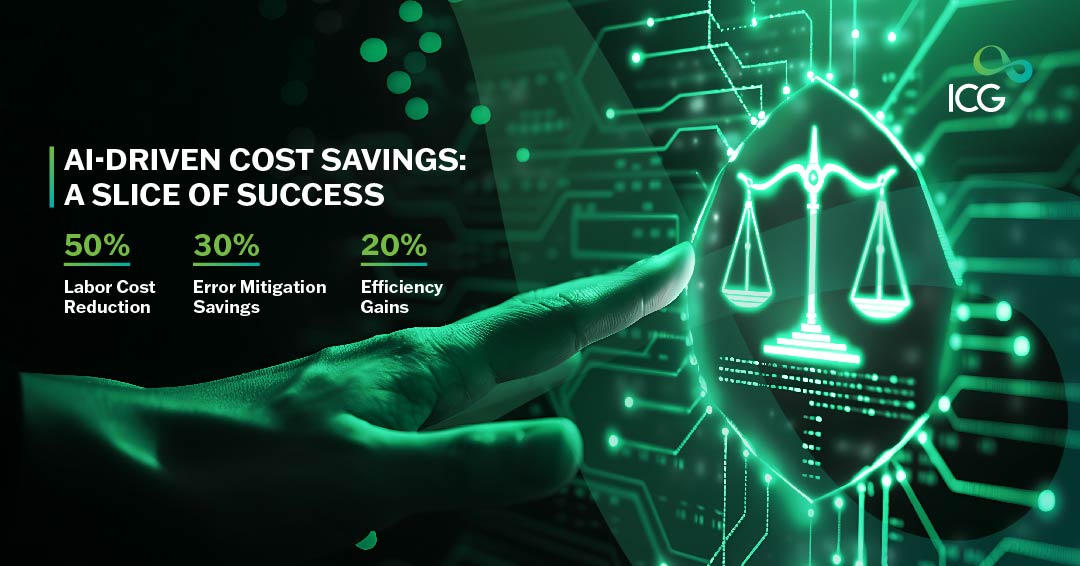The world of law can often feel like a complex multi-verse, filled with detailed regulations and specialized terms that can be overwhelming. For in-house counsel, the daily routine involves handling a mountain of paperwork, like drafting contracts, reviewing agreements, and analyzing legal documents. This demanding environment leaves little to a lot of room for error, as even a tiny mistake can lead to significant legal consequences.
Fortunately, many legal professionals are finding peace of mind just with the adoption of innovative solutions like outsourcing operational tasks and AI-powered technology. One of the most promising advancements is Natural Language Processing (NLP), which enhances how lawyers interact with technology, making their workflows smoother and more efficient.
This article highlights what NLP means for the legal industry, its various uses, the pros and cons it brings, and what the future might hold for this transformative tool.
Transforming the Legal Industry with NLP
Natural Language Processing (NLP) is shaking things up in the legal world, and it’s about time! How great it would be for legal professionals to have a tool that navigates the overwhelming sea of information with ease—well, that’s precisely what NLP does.
By enabling computers to understand and process human language, NLP is making it easier for lawyers to handle the precise wording that the law demands. Let’s dive into some exciting ways NLP is making waves in the legal field.
Applications of NLP in legal practice
Natural Language Processing (NLP) stands out as one of the most transformative advancements in the legal field, offering remarkable benefits to legal professionals. Its capability to comprehend intricate legal contexts and perform tasks autonomously has reshaped how lawyers approach their work.

Let’s delve into some of the critical applications of NLP in the legal sector.
#1 Contract review
Let’s face it: reading through a complicated contract from start to finish can feel like trying to decipher a foreign language. As legal expert Sterling Miller wisely points out, “If you try to read a complex contract carefully, from front to back, and expect to understand it on just the first read-through, that’s wishful thinking (and potentially very messy).”
Traditionally, contract review has been a real slog for legal teams. They have to comb through piles of documents, analyzing every clause and potential risk to make sure everything is in order. With so much information to go through, even the most dedicated in-house counsel can miss important details.
BlackBoiler, another AI tool, is here to save the day! This clever software uses advanced AI and NLP to automate and streamline the contract review process. It can automatically analyze contracts, identifying key terms, clauses, and potential issues without the need for endless manual review. BlackBoiler is a pro at recognizing patterns in legal language, which means it can quickly highlight any discrepancies and suggest changes, reducing the risk of human error.
One of the most incredible things about BlackBoiler is its ability to compare contracts against set templates or playbooks. By automating repetitive tasks, BlackBoiler not only speeds up contract review but also frees up lawyers to focus on more exciting, high-value work.
#2 Legal research
“Effective legal research is not just about finding the right answers; it’s about asking the right questions and using your resources wisely to avoid wasting time and money.”
~ Barbara Fritschel, Law Librarian for the Federal Courts
Many in-house lawyers often cut corners on research due to tight budgets and time constraints. But guess what? Natural Language Processing (NLP) is here to change the game, making legal research more efficient and cost-effective than ever! This branch of artificial intelligence helps computers understand and work with human language. It allows them to sift through vast databases, legal documents, and case law to pull out the relevant information they need.
By grasping the tricky nuances of legal language, NLP-powered tools can quickly analyze and summarize complex texts. With NLP in their toolkit, legal professionals can make informed decisions without spending countless hours buried under piles of paperwork.
In short, NLP is set to transform the traditional way of how legal research is done, enabling lawyers to focus on what really matters: providing top-notch service to their clients!
#3 A reliable drafting assistance
When it comes to legal work, drafting documents like contracts, policies, and correspondence is a big part of an in-house counsel’s job. But are these processes always the easy and light ones? You might answer with a big “No.” Because they are filled with tedious manual tasks and the need for careful coordination among various stakeholders.
NLP is loaded with an ample amount of intelligent tools that are changing the game by automating the more labor-intensive parts of drafting. With NLP, legal professionals can streamline their workflow and boost their efficiency. These tools can sift through tons of legal text, pick up on contextual nuances, and help create precise and relevant legal language that hits the mark.
Not only does this speed up the drafting process, but it also cuts down on human error, resulting in consistent and legally sound documents. With NLP at their fingertips, in-house counsel can focus more on what really matters—crafting solid legal strategies—while leaving the nitty-gritty of document preparation to the machines.
#4 Chatbots for Smart Legals
The rise of NLP-powered chatbots is changing the landscape of legal assistance, making it easier for clients to access information and support. These intelligent chatbots are designed with natural language understanding capabilities, allowing them to engage in meaningful conversations, respond to questions, and even offer preliminary legal advice.
By integrating chatbots into their practices, law firms can increase client accessibility and satisfaction. Clients can get quick answers to their routine inquiries without having to wait for a human lawyer to become available. This not only streamlines communication but also frees up legal professionals to focus on more complex tasks that require their expertise while the chatbots handle everyday queries.
#5 Predictive legal analytics
Natural Language Processing (NLP) is not just about understanding language; it’s also making waves in the era of predictive legal analytics. This powerful capability equips in-house counsel with valuable insights for making informed decisions. By diving into historical legal data, NLP-driven analytics tools can uncover patterns, trends, and potential outcomes that might not be immediately obvious.
With this wealth of information at their fingertips, legal teams can better assess risks, anticipate challenges, and develop proactive strategies to tackle legal issues head-on. This data-driven approach significantly boosts the resilience of legal departments, allowing them to stay one step ahead of potential pitfalls.
As NLP technology continues to advance, it holds the promise of refining legal practices even further and enhancing the accuracy of legal research.
The ICG Approach
At ICG, we offer a customized approach that empowers your teams with the latest insights and technology expertise to navigate the demands of today’s digital age. As Saudi Arabia embarks on its digital transformation journey, ICG plays a pivotal role in shaping the Kingdom’s tech landscape by providing cutting-edge solutions, strategic consultancy, and fostering innovation. Our comprehensive guidance, from fundamental concepts to practical implementation, helps organizations mitigate risks, stay ahead of the competition, and unlock their full potential in the accelerating digital environment.
Ready to talk?
Request your free Consultation to learn more about ICG’s capabilities and enablement to embark on a transformative expedition toward the summit of success.








